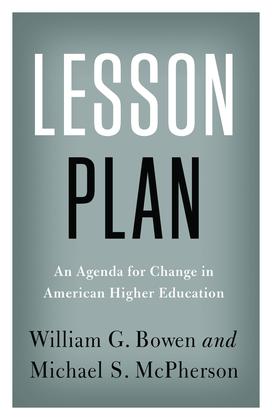Higher Education Today is Falling Short, argues Bowen *58
William G. Bowen*58 and Michael S. McPherson
The book: Many people think that typical college students are drowning in debt or that tuition increases are being driven by administrative bloat. In Lesson Plan: An Agenda for Change in Higher Education, authors William G. Bowen*58 and Michael McPherson explain that these assumptions are false but that many real problems—from the high school dropout rate to inefficient faculty staffing—have received far too little attention.

Bowen and McPherson argue that higher education today is falling short when it comes to vital national needs— too many undergraduates are dropping out or taking too long to graduate; minorities and the poor fare worse than their peers, reinforcing inequality; and college is unaffordable for too many. But these problems could be greatly reduced by making significant changes, including targeting federal and state funding more efficiently; allocating less money for “merit aid” and more to match financial need; creating a respected “teaching corps” that would include nontenure faculty; improving basic courses in fields such as math by combining adaptive learning and face-to-face teaching; strengthening leadership; and encouraging more risk taking.
The authors: Bowen is president emeritus of The Andrew W. Mellon Foundation and Princeton University and founding chairman of ITHAKA. His many books include The Shape of he River: Long-Term Consequences of Considering Race in College and University Admissions. McPherson is president of the Spencer Foundation and former president of Macalester College and author of many books.
Opening lines: “Tempting as it is to put the best possible face on most everything, there are times for candid and forceful self-appraisals. It is in that spirit that we offer our sense of the all-too limited success that American higher education is having today in meeting pressing national needs (its great accomplishments notwithstanding). It is also true… that public discussion often exaggerates, if it does not misstate entirely, issues that lend themselves to hyperbole.”
Review: Lawrence S. Bacow, president emeritus of Tufts University, says that “Bowen and McPherson offer a thoughtful and informed insiders’ critique of the academy,” and James Axtell from the College of William and Mary says, “This short book is big in design, research, and smarts.”












No responses yet